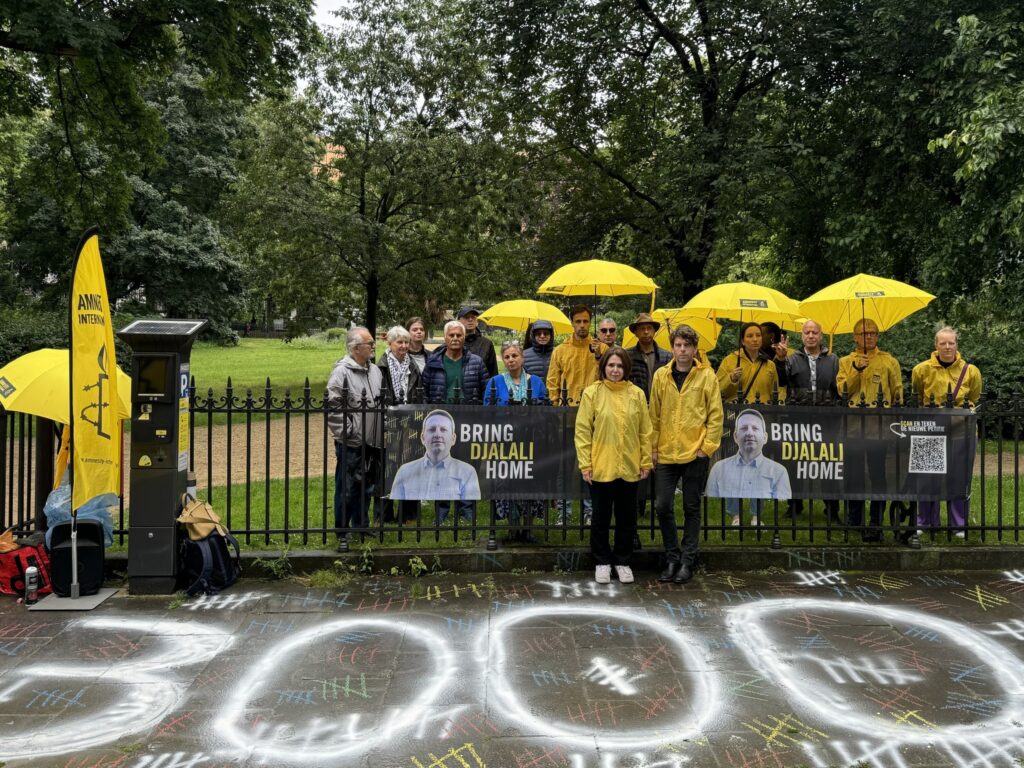Amnesty International is pressuring Sweden to step up efforts to free Swedish-Iranian Ahmadreza Djalali – a guest professor at the VUB who has been held in an Iranian cell for eight years on dubious "espionage" charges.
The human rights organisation argues that Djalali is innocent and Sweden is not doing enough to secure his release. He and his family reside in Sweden and Djalali was granted Swedish citizenship while in prison in Tehran.
"The risk of execution is still high. Together with his wife Vida, we are campaigning. Sweden must do more to get their citizen back to his family," Amnesty International wrote on social media.
Therefore, Amnesty International took action at the Swedish consulate on Square De Meeûs in Brussels last week, a demonstration that observed 3,000 days that Djalali had been detained in an Iranian cell (eight years, two months and 20 days) on 12 July. Djalali was arrested in 2016 and sentenced to death in 2017 for "espionage". Instead of execution, the professor has been detained.
"The regime in Iran is using him as a currency," Gerlant Van Berlaer told Bruzz. He is a paediatric and emergency physician at the UZ Brussels and knows Djalali from his time as a visiting professor at the VUB.
"Every time an Iranian is put on trial in Europe, [the Iranian regime] says he will be hanged the next day. He is blindfolded, taken to death row and allowed to contact his family," Van Berlaer said. "This causes panic among his relatives every time, it is a form of psychological torture."
Now, Amnesty also wants to bring Djalali's fate to the attention of the new European Parliament. "Europe is stronger together and should put joint pressure on Iran to release him, because Belgium and Sweden have failed to do so separately. Djalali feels let down by Sweden, which did (secure the) release of other prisoners."
'Very worried'
Under the banner 'Sweden, bring Ahmadreza Djalali home,' Amnesty has started a new petition that has since collected more than 12,500 signatures. "On 6 May 2023, the authorities executed another Swedish-Iranian man, Habib Chaab (Asyoud)," Amnesty said in the text accompanying the petition.
The action demands that the Swedish authorities do more to reunite Ahmadreza with his family. "Sweden can cooperate more closely with other states to stop Iran's hostage-taking policy, increase public and diplomatic pressure and conduct more investigations into international crimes," organisers say.
Still, Van Berlaer is not very hopeful. "We have already handed petitions to the Iranian embassy, but that made no impression." He added that he is "very worried" about Djalali's health. "He announced last month that he will go on hunger strike again. On a previous hunger strike, he lost about 40 kg. The prison where he is now held also has a terrible reputation, leaked footage shows prisoners being mistreated there."
Related News
- VUB guest lecturer Djalali in Iranian cell goes on hunger strike again
- In the same prison in Iran, treated differently by Sweden?
- Hostage taking: Does the EU need a common strategy for rescuing European citizens?
Last May, Belgian Olivier Vandecasteele was released by Iran in exchange for convicted Iranian terrorist Assadollah Assadi. Last June, Swedish diplomat Johan Floderus was released, also in exchange for an Iranian criminal.
Djalali, however, was never part of the deal. "Diplomats have already made it clear that Iran is asking an incredibly high price for him. Nobody knows why he was arrested, we are left with a mystery."

